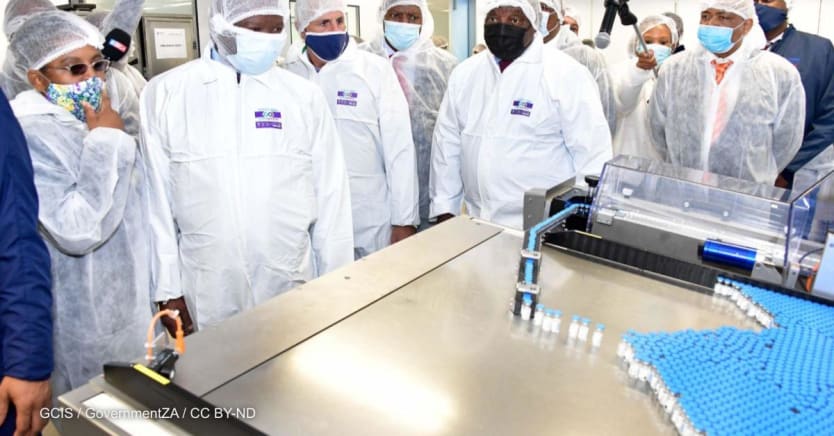
Even as COVID-19 continues to spread, the risk of another pandemic occurring on a similar scale is now increasing, by as much as 2% each year. This rise is partly driven by climate change, which also threatens to trigger a range of dire public health consequences. Nowhere is this threat more acute, and the need for stronger and more resilient health systems so great, than in Africa.
The New Public Health Order, which was recently launched by the African Union Commission and Africa Centres for Disease Control and Prevention, or Africa CDC, to provide a road map to sustainable health outcomes and health security in Africa, sets out to change that.
This continental shift in public health is being driven from within the continent, representing the collective vision of African Union leaders. To achieve this vision, African Union members welcome meaningful partnerships to make it sustainable.
Part of this vision will hinge on the African Union’s goal of developing, producing, and supplying at least 60% of its vaccines by 2040. By increasing Africa’s long-term supply resilience, this would help save lives and improve global health security on the continent and beyond.
Currently, less than 0.1% of the global supply of vaccines are produced in Africa, while only 1% of vaccines used in Africa are manufactured on the continent. However, more than 30 new vaccine manufacturing initiatives are now already underway in Africa, and momentum is gathering to make this expansion possible.
We are today calling for donors and other partners from the public and private sector to support a new Advance Market Commitment to accelerate African manufacturing expansion.
—Significant capital investment is therefore needed, but only building manufacturing capacity is not enough. For these ventures to survive, other factors to consider include existing competition, local regulatory standards, and specific financial commitments to guarantee uptake of vaccines manufactured in Africa.
The potential of this manufacturing expansion to increase supply is huge. Success will depend on African governments and international partners choosing regionally produced vaccines over imported products. That means producing vaccines that not only meet international quality standards of safety and efficacy, but that are also able to compete in terms of price.
Access, however, is not only about price, and even with the best will in the world, African governments have a critical role to play in making local manufacturing sustainable by coordinating demand, to ensure the manufacturing of cost-effective vaccines. If there is not enough demand from African governments for these new African vaccines, then African manufacturers may struggle to survive in the long term.
With vaccine manufacturing, achieving sustainability can be extremely difficult and will take time. This is a challenge that is by no means unique to African producers. To produce vaccines of sufficient and consistent quality requires skill development, sometimes thousands of discrete manufacturing steps, and intense quality assurance and control, all of which have to undergo stringent regulatory approval. This all comes at a high cost, making vaccine manufacturing inherently expensive and will therefore require close coordination and collaboration, as well as sustained investment at the international level.
This is why vaccine markets can be notoriously precarious, making it difficult for new manufacturers to enter an established market. Usually, the only way to bring the price down to globally competitive levels is to produce large volumes, but this can take time and is risky because it is contingent on sufficient demand being deliberately organized and coordinated, for example by signaling their vaccine preferences through organizations like Gavi, the Vaccine Alliance to cover the significant initial investment.
There are many challenges, most of which are classic chicken-and-egg scenarios, and that is why we call on specific commitments to purchase vaccines manufactured in Africa with related financial commitments to achieve this.
Given how much is at stake here, African manufacturers cannot afford to rely on market forces alone. To achieve sustainable manufacturing that can have long-term impact, a targeted and time-limited financial mechanism is required. That is why we are today calling for donors and other partners from the public and private sector to support a new Advance Market Commitment to accelerate African manufacturing expansion and help it achieve sustainability for Africa’s health security.
All stakeholders also have an important part to play in regionalized manufacturing. Through the Partnership for African Vaccine Manufacturing and the African Medicines Agency, Africa CDC has created a framework that will help harmonize diverse efforts across the continent, including those that cover vaccine regulation, technology transfer, and human capital investment, as well as taking steps to clear the way to enable manufacturers get access to markets.
Meanwhile Gavi, as the world’s largest purchaser of vaccines, and the main source to African nations, with a long history of market shaping, has a critical role to play in steering investment decisions and engaging with manufacturers to help identify suitable vaccine markets. This will minimize the risk of overcrowding in existing markets and ensure that innovative vaccines against unaddressed diseases are also targeted.
African governments, in coordination with Africa CDC, also have their part to play by working together to signal their demand for vaccines, by showing willingness to select and procure from African suppliers. As part of its new regional manufacturing strategy for Africa, Gavi will work with supported countries in Africa and Africa CDC to better coordinate and secure continental demand. Building solidarity among African nations will be a critical part of the bigger picture in securing regional resilience in vaccine supply and reducing the demand risk faced by African manufacturers.
This will be a shared effort to pave the way for Africa to expand its vaccine manufacturing industry. This will not only improve vaccine supply across the continent and beyond, it will also be a vital part of Africa’s public health security and transformation, a move that will ultimately save the lives of countless Africans and others across the globe.










